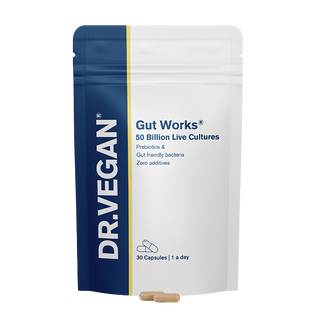How to manage stress to prevent an IBS flare-up?

Irritable Bowel Syndrome (IBS) is a chronic gastrointestinal disorder that affects millions worldwide and can significantly impact quality of life. It is a common, debilitating disorder, often defined by chronic abdominal pain and changes in bowel habits.6 In DR.VEGAN's gut health survey of over 800 men and women, it was uncovered that 66% of people who have poor gut health said their symptoms worsen when anxious.* Alix Tomkinson discusses the link between stress and IBS.
How do high stress levels affect IBS?
Stress is a normal response to life’s challenges, but when it becomes chronic or overwhelming, it can trigger or worsen many health issues, including IBS.4 Stress affects IBS in a number of ways. A key player in this is the gut-brain axis (GBA), a communication highway connecting the central nervous system (the brain and spinal cord) with the enteric nervous system (a complex network of nerves in the gut) via the vagus nerve.6 This bidirectional communication affects digestion, immune response, and even our emotional wellbeing. Think of it as the brain ‘talking’ to the gut and the gut also 'talking’ to the brain.4 Stress does not cause IBS directly, but it triggers and worsens symptoms through various mechanisms.4 Discover what is cortisol and how to lower it.
What are the links between stress and IBS?
Gut-brain axis dysfunction: Stress can disrupt the signals between the brain and gut, leading to a dysregulated gut-brain axis, changes in bowel movements, and increased gut sensitivity.4
Increased intestinal permeability: Stress can weaken the gut lining, allowing inflammatory substances to pass through the gut lining and into the bloodstream, triggering inflammation and worsening IBS.2
Changes in the gut microbiome: Stress can disrupt the balance of bacteria in the gut, leading to symptoms like bloating, diarrhoea, or constipation. Imbalances in the microbiome have been linked to mental illnesses such as anxiety and depression. You may also enjoy reading '6 signs of an unhealthy gut'.
Increased gut sensitivity to pain: Stress can lower the pain threshold in the gut, making it more reactive to pain, gas, and bloating so that mild discomfort feels more severe.4,5
Changes in gut motility: Stress can affect the speed of digestion, either slowing it down (causing constipation) or speeding it up (causing diarrhoea), both common IBS symptoms.5
How do IBS symptoms influence the psychological symptoms of IBS?
- Pain and discomfort: Constant bloating, cramps, and irregular bowel movements create ongoing stress and anxiety.9
- Unpredictability: IBS symptoms can strike suddenly, making social events, travel, or work stressful. 4
- Fear of flare-ups: Psychological symptoms of IBS, such as worrying about being ‘caught-out’ can create a vicious cycle of stress, worsening IBS.4
- Sleep disruptions: Discomfort from IBS can disrupt sleep, increasing stress and worsening gut function. 4
- Emotional impact: The chronic nature of IBS can lead to feelings of helplessness, worsening mental health and a vicious cycle of worsening IBS symptoms.10
Continue learning about IBS or discover 6 signs of an unhealthy gut.
What are the symptoms of an IBS flare-up?
Flare-ups are often triggered by stress, diet, or hormonal changes and occur when symptoms suddenly worsen. The severity and duration vary, but common symptoms include:
Digestive symptoms |
Non-digestive symptoms |
Emotional / psychological symptoms |
|
Abdominal pain and cramping: Often in the lower abdomen, relieved after a bowel movement.9 |
Fatigue: Feeling excessively tired, even after rest.7 |
Anxiety and stress: Stress can trigger or be triggered by flare-ups.5 |
|
Bloating and gas: Feeling full or swollen due to excess gas production.3 |
Nausea: May occur alongside bloating and indigestion.7 |
Sleep disturbances: Pain and discomfort can disrupt sleep, leading to more stress.4 |
|
Diarrhoea (IBS-D): Frequent, loose, or watery stools, sometimes urgent.10 |
Headaches: Often related to stress or dehydration. 4 | |
|
Constipation (IBS-C): Hard, infrequent stools, often with straining.10 |
Back pain: Can be linked to abdominal cramping and bloating.4 |
|
|
Mixed bowel habits (IBS-M): Alternating between diarrhoea and constipation.10 |
Brain fog: Difficulty concentrating, often due to gut-brain axis dysfunction.4 |
|
|
Mucus in stool: A whitish mucus may appear in bowel movements.3 |
|
|
How to break the IBS anxiety cycle
To manage IBS, it’s absolutely key to manage stress and anxiety levels. Here are some ways to help
- Stress management: Research shows that improving psychological health can help improve digestive health, improving abdominal pain and other IBS symptoms. Mindfulness, meditation, yoga, deep breathing, and good sleep have all been shown to help reduce IBS flare-ups.6
- Dietary changes: DR.VEGAN's gut health survey found that refined bread, fizzy drinks, alcohol, dairy and biscuits were some of the biggest causes of IBS and digestion issues.* A low-FODMAP diet can be helpful in reducing symptoms and involves removing highly fermentable carbohydrates, responsible for producing gas, bloating and other IBS symptoms. 1,10,11
- Regular exercise: Physical activity can improve gut movements and stress levels. Regular cardiovascular exercise, such as yoga, walking, running, or swimming, may help regulate bowel contractions and relieve abdominal pain by increasing blood flow of nutrients and oxygen to the gut.8
-
Probiotics and gut health: Supporting a healthy gut microbiome can make the gut more resilient to stress.2,10 DR.VEGAN's Gut Works® is a great option to try here. Gut Works® combines prebiotics and fibre with 6 clinically studied strains of probiotics. Since IBS is a condition with both physical and psychological triggers, managing diet and stress levels are equally important. A multi-factorial approach is essential to manage symptoms. You may also want to look at trying Stay Calm®, a blend of botanicals with adaptogenic properties and minerals that work together to help the body cope calmly with stress.
Discover our range of award-winning vegan supplements and probiotics.

About Alix
Alix Tomkinson is a registered nutritional therapist with over 20 years experience in the field of nutrition. She specialises in uncovering the root causes of complex health conditions, from IBS to stubborn weight loss, helping clients find lasting relief and long term health. With a degree in human nutrition and a diploma in nutritional therapy, she combines science-backed strategies with a personalised approach. Based in South Staffordshire, Alix works both in her clinic and online, offering expert guidance to those seeking transformative health solutions.
You may also enjoy reading
References






















